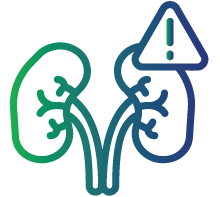
ANCA Profile, ELISA Test
The ANCA (Anti-Neutrophil Cytoplasmic Antibodies) Profile, ELISA is a diagnostic test used to detect specific antibodies in the blood associated with autoimmune diseases. This test primarily identifies cytoplasmic (c-ANCA) and perinuclear (p-ANCA) antibodies, which are linked to conditions like vasculitis. The ELISA method enhances sensitivity and specificity, making it a valuable tool for early and accurate diagnosis.
What is the ANCA Profile, ELISA Test Used For?
This test is essential for:
- Diagnosing autoimmune vasculitis, such as Granulomatosis with Polyangiitis (GPA) and Microscopic Polyangiitis (MPA).
- Monitoring disease activity and treatment response in vasculitis patients.
- Differentiating between types of autoimmune disorders involving systemic inflammation.
Symptoms Indicating the Need for the Test
The ANCA Profile, ELISA test is recommended if you experience symptoms such as:

Persistent sinusitis or nasal crusting

Coughing, sometimes with blood (hemoptysis)

Kidney dysfunction, such as blood or protein in the urine

Unexplained joint pain or swelling

Skin rashes, ulcers, or purple spots (purpura)

Fever, fatigue, or weight loss without a clear cause
Preparation for the Test
To prepare for the ANCA Profile, ELISA test:
- Inform Your Doctor: Notify your healthcare provider about medications or supplements you are taking, as they may influence antibody levels.
- Fasting: Fasting is not required unless otherwise instructed.
- Blood Sample Collection: A blood sample will be drawn from a vein, typically in your arm, for analysis.
Interpretation of Results
The test results identify the presence and levels of specific antibodies:
- c-ANCA (Cytoplasmic Pattern):
- Often associated with Granulomatosis with Polyangiitis (GPA).
- Positive results indicate active vasculitis.
- p-ANCA (Perinuclear Pattern):
- Linked to Microscopic Polyangiitis (MPA) and eosinophilic granulomatosis with polyangiitis (EGPA).
- Elevated levels suggest autoimmune inflammation.
- Negative Result:
- Indicates the absence of significant ANCA-related activity. However, additional tests may be necessary to rule out other conditions.
Discuss your results with a healthcare provider for accurate diagnosis and treatment planning.
FAQs
What are ANCA antibodies, and why are they important?
Anti-Neutrophil Cytoplasmic Antibodies (ANCA) target specific proteins in white blood cells, causing inflammation and tissue damage. They are markers of autoimmune vasculitis.
Can this test confirm vasculitis on its own?
No, while the ANCA Profile, ELISA is a critical tool, diagnosis often requires clinical evaluation and imaging studies.
How long does it take to receive the test results?
Typically, results are available within 3–5 days, depending on the laboratory.
Are there conditions that can cause false-positive results?
Yes, infections, certain medications, and other autoimmune diseases may produce false positives.
How is the test different from an indirect immunofluorescence assay (IFA)?
The ELISA method provides quantitative results with higher specificity, while IFA offers pattern-based visualization of antibodies.

